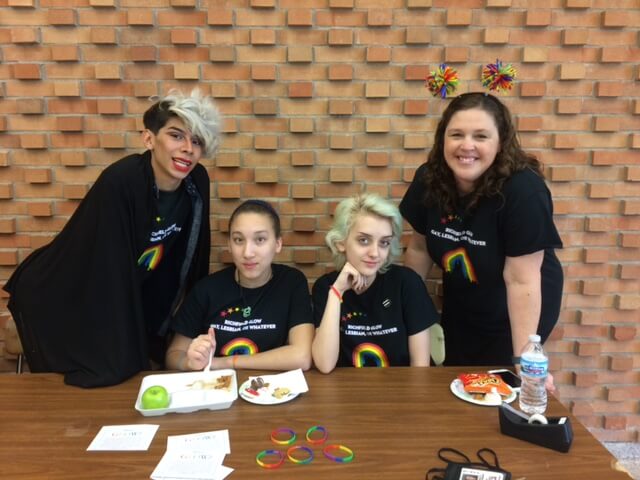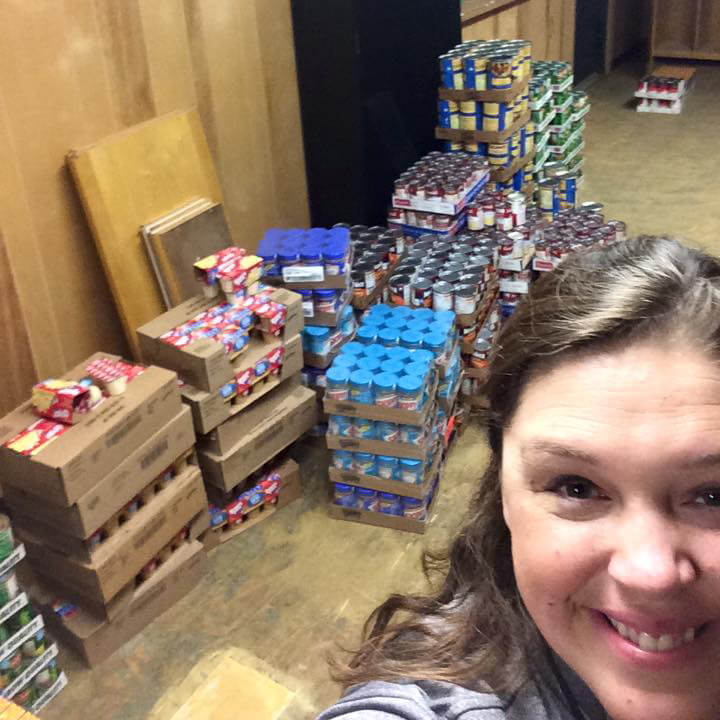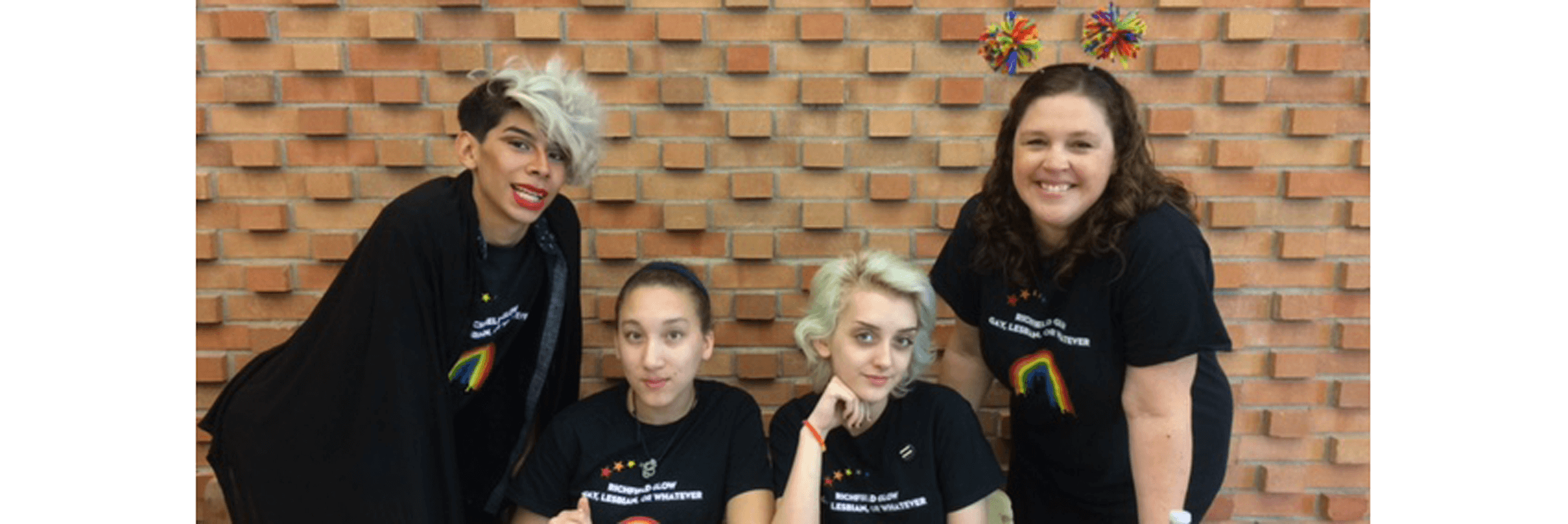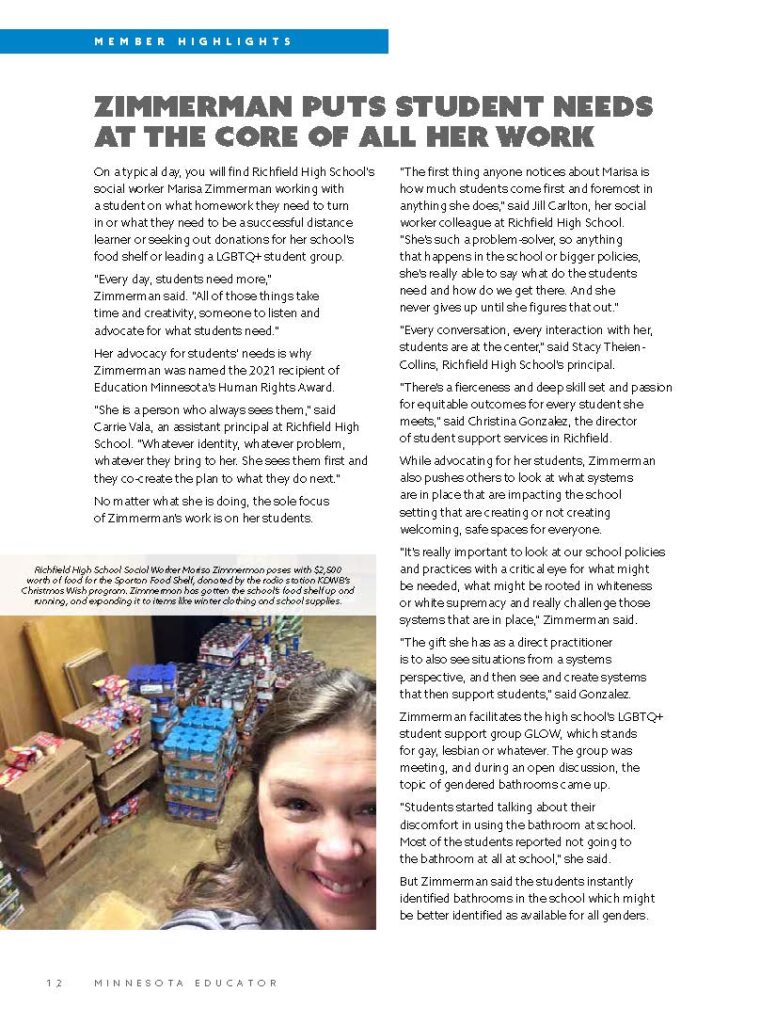On a typical day, you will find Richfield High School’s social worker Marisa Zimmerman working with a student on what homework they need to turn in or what they need to be a successful distance learner or seeking out donations for her school’s food shelf or leading a LGBTQ+ student group.
“Every day, students need more,” Zimmerman said. “All of those things take time and creativity, someone to listen and advocate for what students need.”
Her advocacy for students’ needs is why Zimmerman was named the 2021 recipient of Education Minnesota’s Human Rights Award.
“She is a person who always sees them,” said Carrie Vala, an assistant principal at Richfield High School. “Whatever identity, whatever problem, whatever they bring to her. She sees them first and they co-create the plan to what they do next.”
No matter what she is doing, the sole focus of Zimmerman’s work is on her students.
“The first thing anyone notices about Marisa is how much students come first and foremost in anything she does,” said Jill Carlton, her social worker colleague at Richfield High School. “She’s such a problem-solver, so anything that happens in the school or bigger policies, she’s really able to say what do the students need and how do we get there. And she never gives up until she figures that out.”
“Every conversation, every interaction with her, students are at the center,” said Stacy Theien-Collins, Richfield High School’s principal.
“There’s a fierceness and deep skill set and passion for equitable outcomes for every student she meets,” said Christina Gonzalez, the director of student support services in Richfield.
While advocating for her students, Zimmerman also pushes others to look at what systems are in place that are impacting the school setting that are creating or not creating welcoming, safe spaces for everyone.
“It’s really important to look at our school policies and practices with a critical eye for what might be needed, what might be rooted in whiteness or white supremacy and really challenge those systems that are in place,” Zimmerman said.
“The gift she has as a direct practitioner is to also see situations from a systems perspective, and then see and create systems that then support students,” said Gonzalez.
Zimmerman facilitates the high school’s LGBTQ+ student support group GLOW, which stands for gay, lesbian or whatever. The group was meeting, and during an open discussion, the topic of gendered bathrooms came up.

“Students started talking about their discomfort in using the bathroom at school. Most of the students reported not going to the bathroom at all at school,” she said.
But Zimmerman said the students instantly identified bathrooms in the school which might be better identified as available for all genders.
“I said, ‘What do we want to do with this? Do you want to bring this to the principal?’ And they said, ‘yes, yes,’” she said.
The principal loved the idea and within a month, single-stall bathrooms were turned into all-gender spaces, and when the school went through some new construction recently, several all-gender bathrooms and lockers rooms were added.
“It was a really exciting time for the students to feel like their voices were heard and that their feelings mattered and that their safety at school mattered as well,” Zimmerman said.
Zimmerman has also made gender inclusion a conversation at the district level and in all classrooms when it comes to policies and structures and the language used.
“She makes sure teachers are including things in their classrooms so students are being seen,” Vala said.

Zimmerman has gotten the school’s food shelf up and running, and making sure there are other items besides food, including hygiene products, school supplies and winter clothing.
She has made sure that the health center on campus has been integrated well into the school community by making sure the external providers don’t feel like external providers, said Vala.
“It takes a really special person to listen to a student and understand their perspective, and then come to a meeting with administrators and communicate those needs,” said Vanessa Anderson, a school social work intern who has been working with Zimmerman this year.
Zimmerman has an open door for the school’s staff, too.
“Everybody looks to Marisa,” Carlton said. “She will offer safe spaces for teachers to talk about what they need and what they are talking about with their students.”
While Zimmerman is quick to say that her students are the ones leading this important work, her colleagues know they wouldn’t be able to advocate for themselves as well as they do without her.
“The strength that Marisa brings to our team is to assess student needs, to understand where our school community is and where our struggles are, and still to be focused on what we need to offer our students,” said Theien-Collins.




